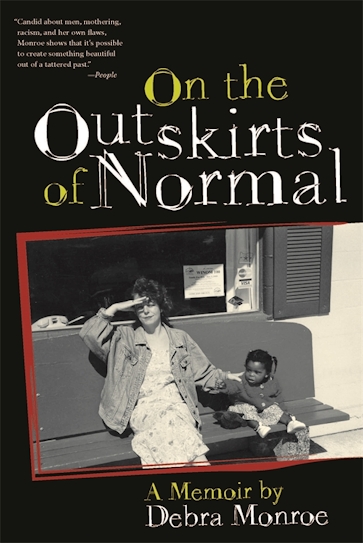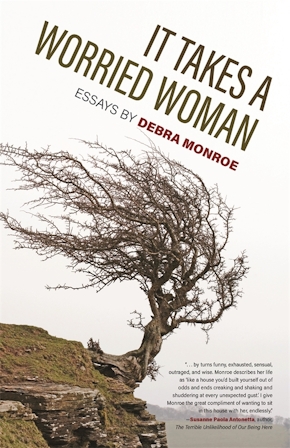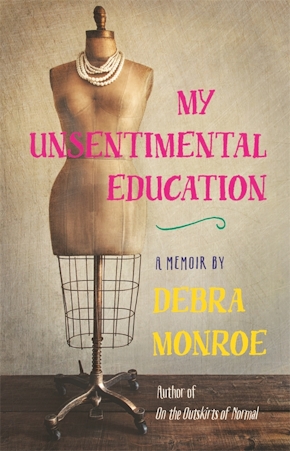In a setting where working mothers are rare, novelist and Debra Monroe’s adoption of a black baby puts her On the Outskirts of Normal.
—Vanity Fair
A single woman’s spunky memoir about the hazards and rewards of building a home and a family outside a small Texas town. Novelist and short-story writer Monroe adopted Marie, an African-American baby, and raised her in the Texas countryside where single female professors were an oddity and single white women with black babies were unheard of. The child of divorced parents and with two failed marriages behind her, the author wanted to create a loving family of her own, but first she had to fashion a suitable home out of a rundown cabin she owned. How she became her own contractor and handled the assorted workmen who didn't know how to deal with a female boss could have been a stand-alone story, but the author integrates it into the larger context of motherly love. Single motherhood is challenging, but when race, misdiagnosed illnesses, surgery and the demands of a busy professional life are added, the struggles are compounded. Some problems—e.g., how to handle Marie's mass of hair--are not exactly serious, but nevertheless time-consuming and frustrating. "If you're white," writes the author, "black hair care is a secret," and she devotes an entire chapter to her dedicated search for the key to that enigma. Finding a mate amid adverse circumstances--the pickings for a female professional are slim in rural Texas—presents another problem, but the central issue is the journey of parenting. This tale of trials and triumph is an engaging, poignant read.
—Kirkus Reviews
Monroe delivers compassion, keen wit, and acute honesty. She never lets us blink; we stare while she figures out how to handle her daughter's hair; while she suffers at the hands of a doctor; and while her neighbor makes a bad judgment call, leaving her yard and house exposed to passing cars and random predators. She shares her fear with us, and, in doing so, reveals her own bravery
—Foreword Reviews
Monroe doesn’t waste time justifying her family to others—her care and clear-eyed focus on her daughter make their own argument. It’s absolutely clear this is the life she chose. “The sprawling mess of life is why we need stories,” she writes, “a fleeting sense of order so we return to life with the unproven but irresistible conviction our mistakes and emergencies matter
—Amy Benfer, Barnes & Noble Review
High-velocity verve and gripping insight matched in rare form by the level of compassion—anyone who cares this much about getting a little girl’s hair just right is a truly endearing person. Flaws and question marks, local places, very particular people, wit and weariness and astonishment at the myriad ways a life unfolds—inviting readers not only to the comfortable “outskirts of normal” but the genuine heart of it all.
—Naomi Shihab Nye
Having driven across the country to see her brand-new adopted granddaughter, Debra Monroe’s mother says the first thing that comes into her head. “I knew she’d be black, but not this black.” There are many possible reactions to this, but Monroe simply says, “Mom, there’s a blank in the baby book called ‘Grandma’s First Words.’” The sly, dry humor of this—the offering of the second chance, the reminder that everything, even the mistakes, will be written down—tells you everything you need to know about Monroe’s approach to life, and memoir. Monroe’s generosity of spirit and excellent word choice never fail her.
—Marion Winik, author of First Comes Love
Debra Monroe’s On the Outskirts of Normal is a modern story with a generous dose of old-fashioned values at its core. The adoption of a beautiful black baby girl by a white single woman shouldn’t still be news in today’s America, but it is, perhaps especially so in a small Texas town. Told in a voice that is feisty, wise, unsentimental, humorous, candid, and consoling, Debra Monroe’s memoir of love that was lost, but now is found, will entrance its readers, who will surely admire the author’s ability to transcend negative or befuddled reactions to her and her daughter as she inaugurates a whole new conversation about the true meaning of family. This book is the real deal: both a literary triumph and a triumph of the heart.
—Madeleine Blais, Pulitzer Prize winner and author of In These Girls, Hope is a Muscle
Sometimes the barren years bloom, flourishing atop old scar tissue, and give each of us a new heart. This, then, is the promise of Debra Monroe’s extraordinarily poignant, powerfully written memoir, which charts one woman’s tenacious journey into strength and unlikely motherhood and unexpected joys. She gathers along the way the brave yet painful knowledge of what love costs. Monroe is an unflinching commentator on self as well as society, a myth-buster as well as a trailblazer in an America that is neither post-racial nor post-sexist, and I suspect the significance of this book will only grow in value, a cultural benchmark, in the years and decades ahead of us.
—Bob Shacochis, National Book Award-winning author of Easy in the Islands and Domesticity: A Gastronomic Interpretation of Love
Compelling and full of pain and honesty, On the Outskirts of Normal wrestles with the messiness of the search for insight in the wake of trouble. Debra Monroe approaches the subject of race, always fraught with landmines, with humor and humility. Full of stylish shifts and comic, edgy observations, Monroe’s story reveals much about parents who are present and parents who are absent, about good and bad caregiving, and about the stability of the places we call home.
—David Haynes, author of Somebody Else’s Mama and The Full Matilda
Any narrator who repels an intruding raccoon by pelting it with books of poems has my full attention. Debra Monroe has written a wise, unsparing testament to the fierceness and fragility of love.
—Michael Perry, author of Population 485: Meeting Your Neighbors One Siren at a Time and Truck: A Love Story
Debra Monroe forges not only her charming “family against the grain,” but a remarkable canniness about motherhood and its twin perils, grief and love.
—Karen Brennan, author of Being With Rachel
Debra Monroe writes about the complications, and gifts, of transracial adoption.
—Salon
Should a middle-aged white woman with a history of failed relationships try to raise a black baby in small-town Texas? Author Monroe proves she's got the right stuff. Candid about men, mothering, racism, and her own flaws, she shows that it's possible to create something beautiful out of a tattered past.
—People
If
On the Outskirts of Normal were a country-rock song, Lucinda Williams would sing it. In this graceful, disquieting and intensely felt account of her navigation from the outskirts to normal, Monroe offers the story of how she became the mother she needed to be—not to Marie, who in Monroe always had a fine mother, but for herself, so she could finally have and keep what she deserved.
—Atlanta Journal Constitution
An unsentimental memoir about a white woman who adopts a black baby in a small Texas town.
—O, the Oprah Magazine



